- Home
- Courtney Milan
The Carhart Series Page 8
The Carhart Series Read online
Page 8
“Right,” the solicitor said, shuffling a pile of papers on his desk. His tone was all brisk business. “I assume we’ve come to an understanding, then. You’ll file for relief in Chancery, contesting Mr. Sherrod’s will on the grounds of insanity. I will protest, saying that the foibles of his mind were precisely what one might expect in a man of his age.”
“And then I’ll get the money?” Two weeks ago, five thousand pounds might have meant surcease from drudgery, an escape from his cold world. It would have meant hot fires and fresh meat and large, comfortable rooms. Today, he could think of only one thing he wanted. Five thousand pounds meant Lavinia. It meant he could ask her to marry him, selfish idiot that he was. He could lift his eyes to her face. He could offer her everything she deserved—riches and wealth, without any hint of privation. She would have everything of the best.
No. Not everything. The man that came with it would not be up to her standards.
“Well,” the solicitor hedged, “you might not get the money immediately. You might have to wait until after Chancery has sorted matters out, after it has conducted a hearing or…or two on the matter. But surely then, you’ll have his fortune.”
She would want him to grasp at any chance for her. Wouldn’t she? Wouldn’t she want a man who was able to hope?
William swallowed the bitter taste in his mouth. “What would I have to tell the courts?”
“Simple. Tell them Mr. Sherrod was mad. Manufacture stories, explaining that he saw things that were not present, that he spoke to pixies. Find folk who would attest to such tales. It would be a simple matter, if you paid—ahem, I mean, if you found enough of them.”
“You expect me to lie, then.”
“Goodness. I would never suborn perjury. I want you to tell the truth.” This supercilious speech was somewhat weakened by a wink. “The truth, and nothing but the truth. A hint of embroidery, though, would not be amiss. Think of a court case like a woman’s frock—you hide the parts of the figure that are not so flattering, and frame the bosom so that everyone can look at the enticing bits.” The solicitor made a gesture in the direction of his own chest. “Just enough embellishment to convince the court of your claim, hmm?”
No matter what this greasy lawyer told him, William was fairly certain he had nothing but a tiny chance at success. He might not find people to testify. The court might not believe them. Sherrod’s widow would undoubtedly claim otherwise. Still, a tiny chance was a chance nonetheless.
Was this hope that he felt, this grim determination to see the task through? Was it hope that wrapped around his throat, choking him like a noose? Was that morass, sinking like a stone in his stomach as he gritted his teeth and prepared to do business with this oily man, what he needed to accept?
Yes.
He opened his mouth to give his assent.
But as he did, he heard that voice again.
You don’t have to do this.
The voice was wrong. He did have to do this. Today, when he went in to work, he might lose everything. He might have no position, and Lavinia could be pregnant. He had to accept any chance, no matter how small, that could help.
No, you don’t. You don’t have to do this.
This time, he recognized the words for what they were. They didn’t come from some outside agency. He was the speaker. Even if he denied it—even as he betrayed himself—he’d always retained some semblance of his honor. It had not disappeared. It had simply been here, waiting for him to follow.
For so long, he’d simply believed he had sunk so low in society that he did not dare to lift his face. Oh, yes, he’d dishonored himself. But he couldn’t find honor by seeking forgiveness. He could not wait for Lavinia or anyone else to absolve him of his sins.
If William ever hoped to have some measure of honor, he had to be an honorable man.
The solicitor must have seen his hesitation.
“Think,” he said, “on the revenge you could take on the man who destroyed your father.”
He’d dwelled on that dark thought for a decade. But how could he expect forgiveness for his own sins, if he could not grant absolution to the man who’d wronged him?
He would have to give up any chance at those five thousand pounds. That meant he would give up any chance at having Lavinia—but then, when Lavinia had told him to hope, she hadn’t meant that he should hope for her.
She’d wanted him to hope for himself.
“No,” he said. It felt good in every way to know that he could choose to be honorable, even knowing the cost.
Confusion lit the solicitor’s face. “No? What could you possibly mean by no?”
“No, I won’t embellish the truth past recognition. No, I won’t tell lies. No, I won’t seek revenge to keep you in Chancery fees. I’m not that kind of man.” He had been, once, but he was no longer.
“Who will ever know that you lied?”
William shrugged. “Me?”
“You?” The solicitor laughed in scorn. “Well, trust in yourself, then. You’ll not deliver yourself from poverty.”
William stood. He’d thought his soul had depreciated until it was worth less than nothing. Strange he’d not realized: it always had precisely the value he chose to give it.
As he left, the man called out after him. “I hope you take great pleasure in yourself. Likely it’s all you’ll ever have.”
The words no longer sounded like the curse they once would have been.
ON CHRISTMAS EVE MORNING, Lavinia shared the responsibility of running the shop with her brother. The two of them, even in that small downstairs room, should not have made the room feel so close. Yes, there were nearly fifteen hundred volumes packed into a tiny space. The shelves stretched head height and above. But Lavinia had never found the two tiny rooms confining before, not even with a surfeit of customers. But today the books seemed to tower over her, choking her with memories.
She would look up from her desk and remember the first time she’d seen William, standing so ill at ease in front of her, asking for a subscription. She would place a volume back on the shelf and remember the sight of him in that very spot, searching for a title. He would run his finger carefully down a leather binding. In those days, she’d envied the books. But now, he’d touched her with greater reverence.
He’d not been able to hide the meaning of those gestures. Over and over, he’d told her he loved her. He loved her, and so he made her wretchedly watered-down tea. He loved her and he longed to touch her, but instead he warned her she’d have no butter with her bread. He loved her.
And yet she’d brought him hopelessness rather than happiness. Together, they’d managed to share a fine portion of guilt. She might gladly have suffered deprivation for him, but he was not the kind of man who could watch the woman he loved be deprived.
Over at the small table near the door, Lavinia watched as James entered a book loan in the ledger. He slipped two pennies in the cash box and then wrapped a book and waved farewell to Mr. Bellow. As he recorded the transaction, he avoided her gaze. She came up to the table anyway, approaching it from the front, as if she were a customer instead of a fellow laborer. Still, he winced.
“I did it exactly as you instructed,” he whispered. “Did I do it wrong? Oh God, I did it so completely backward you can tell it’s wrong without even reading what I’ve entered.” He put his head in his hands.
“You’re doing very well.” She resisted the urge to turn the book upside down to check. “Perfect, even.” No, she was not going to even glance down. “You’re doing so well, in fact, that I am going upstairs to rest.”
He lifted his face. His eyes shone in pleasure. “I’ll take care of everything.” Then he paused. “But perhaps an hour or two before we close up the shop, would you be willing to take over again? There is one thing I should like to take care of this evening.”
She patted her brother’s hand. “Of course,” she said with a smile.
She headed upstairs. She would not have minded deprivation for h
erself. But William… If her gloves had holes, William’s hands would freeze in sympathy. If she ate brown, unbuttered bread, the bitter taste would linger on his palate.
She’d given him hopelessness. She’d made him miserable. If she truly loved him, perhaps she needed to let him go.
Chapter Six
TWENTY-FOUR HOURS EARLIER, William had cowered in the office where he worked, for fear of losing his position. Today when he walked in, he felt not even a hint of disquietude.
Why had he been so afraid? He was young. He was competent. And even if he were turned off, he would find something else. Losing a position where he was regularly treated like the grimiest gutter refuse was not something to fear. It was something to celebrate.
When the door to the office opened just after nine and in walked Lord Blakely followed by his glowering grandson, William felt triumph.
When he was let go, it would be a financial setback. It might take weeks to find work again; his wages might even be reduced. He ought to have been terrified. But this was not a punishment, to be allowed to walk out of this dark and dismal place. It was an opportunity.
The two lords stepped into the back office. After a few minutes Mr. Dunning walked up to William and whispered that he’d been asked to enter the room. They were unlikely to be inviting him to a picnic lunch. Just before he stood, Mr. Dunning laid his hand on William’s shoulder—an empty gesture of pointless support.
William smiled and stood, calm. Let them sack me. Please.
He’d expected the back office to appear precisely as he’d left it yesterday.
But when he arrived, there had been one tiny alteration. Lord Blakely still peered at him from beneath white, bushy eyebrows, examining him as if he were some strange insect. But the marquess had not seated himself in his throne behind the desk. Instead, he’d ensconced his grandson in the position of power. Lord Wyndleton sat, ill at ease. He smoldered with a repressed anger so fierce that William thought he would leave scorch marks where he tapped his fingers against the desk.
Three account books, a small portion of the work William had done over his years of employment, made a small pile on the edge of the desk.
The old marquess picked up one negligently and thumbed through the pages. “Sometime between the months of January and—” a pause, and a last glance at the end of the third book “—April, Bill Blight here made a mistake.”
William did not mind being stripped of his position and his wages. He no longer fancied losing his dignity alongside. “My lord, my name is William White.”
Naturally, Lord Blakely took no notice of the interjection. “Bill Blight made an error. Find it and then sack him. When you can lay the mistake before me, I shall allow you to leave.”
Lord Wyndleton sighed heavily, but reached for a book. He opened it and stared intently at the first page. His grandfather watched, silent, for a few minutes as the young lord scanned the entries. Finally he shook his head and walked out, leaving the two younger men together. William heard the front door to the building rattle shut; shortly after, the jingle of his carriage sounded.
As soon as they were alone, the young lord looked up. “Did you make a mistake between the months of January and April?”
William rolled his eyes. “Yes.”
“Well, tell me what it was. I haven’t got all day.”
“I don’t know. Between the months of January and April, I must have accounted for upward of four thousand transactions. Of course there was a mistake somewhere in the lot—it’s impossible not to make one. If your grandfather were even halfway rational, he wouldn’t sack his employees for minor imperfections.”
William had thought the insult to the marquess would be enough to have him sent on his way.
“Hmm,” Lord Wyndleton said. “Four thousand transactions.” He glanced up at William, and then shook his head as if it were somehow William’s fault he’d been so efficient. “What a bloody nuisance.”
With that, the man turned his head down to the books. Minutes passed. His eyes moved slowly down column after column. He turned one page, then another. At the turn of the tenth page, William sighed and sat down without permission.
The old marquess might have turned him off for that offense in an instant; his grandson didn’t even appear to notice.
At the twentieth page, William began to wish he hadn’t been so meticulous in his accounting. If he’d missed a shilling on the first page, at least he would have been able to leave.
At the twenty-sixth page, Lord Wyndleton sighed loudly. “I bloody hate this,” he muttered.
How sweet. They had something in common. It was time to escalate his plan to get sacked.
William was already bored. And he had nothing to lose. “I hear you are interested in scientific pursuit.”
Lord Wyndleton’s eyes moved only to glance down the page of numbers in front of him. He turned his hand over. It might have been an unconscious gesture. It might have been the barest acknowledgment of William’s uttered words.
William decided to take it as acknowledgment. “Well, then. I should think you’d enjoy numbers.”
Lord Wyndleton shrugged but still did not look up. He flipped to the front of the book, then back to page twenty-six. For a long while William thought the man was going to ignore him.
But the viscount finally spoke without lifting his eyes from the page. “I do like numbers. I like numbers when they are attached to little t and double-dot-x. Maybe a calculation of probability.” He spoke in swift, clipped tones, his voice unemotional and unvarying. “I dislike arithmetic. Finance bores me. It has no rules to discover. Just opportunity for error.”
“Ah,” William said. “You prefer calculus?”
Lord Wyndleton sighed and turned to page twenty-seven. Then he looked up—although he didn’t look directly at William. Instead, he leaned his head back and fixed his gaze on the ceiling. “Let me tell you what I dislike. I dislike servants who make obscure mistakes, forcing me to spend Christmas Eve morn studying dusty accounting tomes. My dislike accelerates when said servant attempts to distract me from my duty by yammering on. That means, Bill, I dislike you.”
“That,” said William, “makes us a pair. I despise men who let their vast fortunes go to waste. You’re so helpless, you can’t even get thirty miles on a Christmas Eve. You’re spending your morning glowering at books instead of going to Tattersall’s and purchasing a very swift horse.”
“If my grandfather did not control my fortune, I would have done precisely that.”
The viscount was angry. He was, also, William realized, entirely serious.
William stared at him for a few moments, his own pique dissipating. “You really don’t like finance,” he finally said. “Your grandfather doesn’t control your fortune.”
“Ha.” Lord Wyndleton undoubtedly intended that single syllable to be a dismissal.
“It wasn’t I who made the mistake. It was the marquess.”
“Do be quiet.”
“He ought never have left you alone with me.”
Lord Wyndleton slammed his pen down. “Oh, Lord almighty,” he muttered to the desktop. “What are you going to do to me? Annoy me to death?”
“You see,” William continued, “I’ve recorded the accounting for your trust every month since I started here. Those funds became yours, free and clear, upon your majority.”
Viscount Wyndleton cocked his head and turned it. It was a gesture reminiscent of his grandfather—and yet on him, it seemed attentive rather than predatory. His eyes were steady and almost golden-brown. For a few seconds he stared at William, his lips parted.
William knew precisely what that look meant. He was entertaining hopes. Then he let out a breath and shook his head. “No. When the trust was established, the money would have become mine on my majority. But six years ago I came to an agreement with my grandfather. I signed over control of my funds after my majority. In exchange he let me—well, never mind that. Your information is wrong.”
; He paused, tapping his pen against his wrist. “Next time, if you have something to say, come out and say it. I don’t hold with talking in such a roundabout fashion, as if you’re a cat circling your prey. Pounce already and be done with it.”
For a second William thought the young lord intended to leave his words at a rebuke. But then Lord Wyndleton looked up again. “But thank you,” he said. “It was well-meant.”
So the grandson was not the grandfather, however alike they might have seemed at first. What had started as resentment on William’s part had turned into something—something more. He wasn’t sure what it was yet.
William stood. “I’ve seen the statements. I’ve recorded the accounts. I know every detail, and they’re in your own name.”
“Couldn’t be. There must be some legal nicety you’re missing. Blakely is too meticulous. I signed a contract, and I have no doubt the matter it covered was executed immediately. He wouldn’t miss the opportunity to keep me under his thumb.”
“This contract—you signed it six years ago?” The hackles on William’s neck rose. His calm dissipated. A great and sudden weight tensed on his shoulders. “You’re two-and-twenty now?”
Lord Wyndleton waved his hand and turned back to the books, dismissing William. “This isn’t getting me any closer to my mother’s home.”
William strode forward and slapped his hand over the page Lord Wyndleton was reading. “I’m pouncing. The agreement wasn’t executed because it couldn’t have been. Legally you were an infant. The contract was a nullity. It’s the rankest abuse of power for your guardian to have required you to give away what was rightfully yours in exchange for…for something else that is rightfully yours.”

 Her Every Wish
Her Every Wish Midnight Scandals
Midnight Scandals After the Wedding
After the Wedding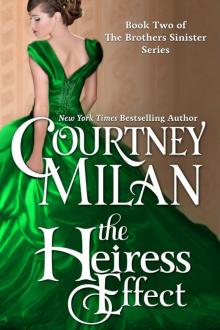 The Heiress Effect
The Heiress Effect Unraveled
Unraveled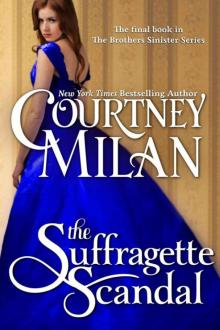 The Suffragette Scandal
The Suffragette Scandal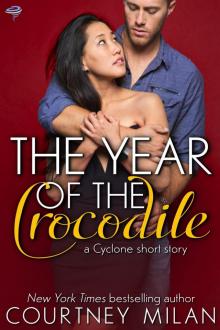 The Year of the Crocodile
The Year of the Crocodile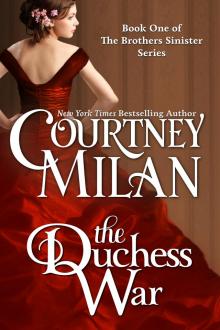 The Duchess War
The Duchess War What Happened at Midnight
What Happened at Midnight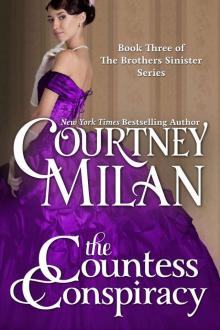 The Countess Conspiracy
The Countess Conspiracy Proof by Seduction
Proof by Seduction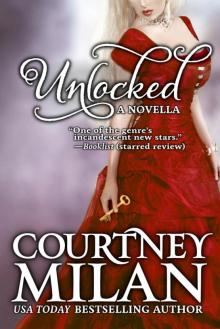 Unlocked
Unlocked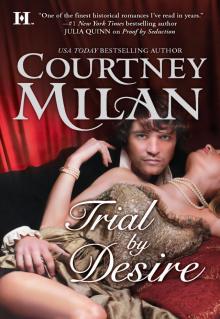 Trial by Desire
Trial by Desire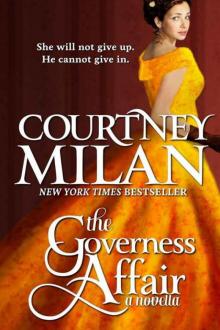 The Governess Affair
The Governess Affair Unveiled
Unveiled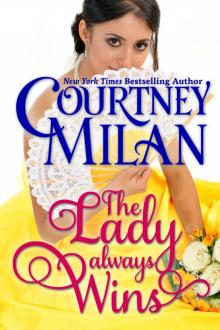 The Lady Always Wins
The Lady Always Wins Trade Me
Trade Me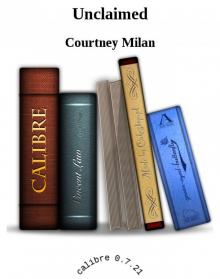 Unclaimed
Unclaimed This Wicked Gift
This Wicked Gift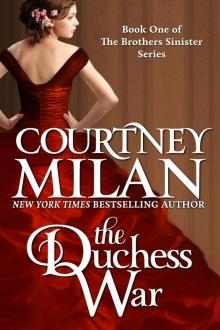 The Duchess War (The Brothers Sinister)
The Duchess War (The Brothers Sinister) Hamilton's Battalion: A Trio of Romances
Hamilton's Battalion: A Trio of Romances The Turner Series
The Turner Series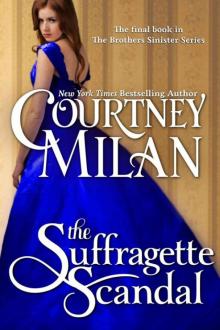 The Suffragette Scandal (The Brothers Sinister)
The Suffragette Scandal (The Brothers Sinister)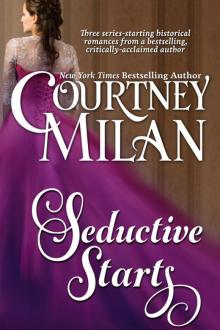 Seductive Starts
Seductive Starts The Pursuit Of…
The Pursuit Of… Hamilton's Battalion
Hamilton's Battalion The Carhart Series
The Carhart Series Seven Wicked Nights
Seven Wicked Nights This Wicked Gift (A Carhart Series Novella)
This Wicked Gift (A Carhart Series Novella)